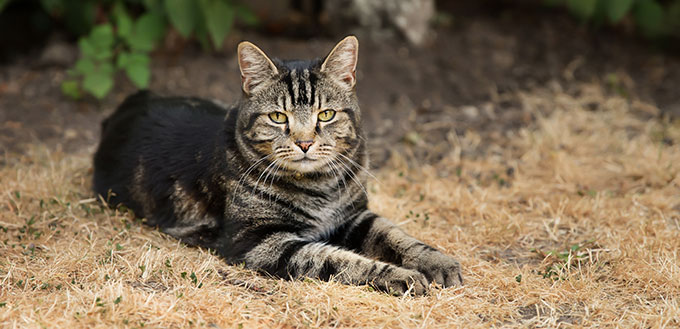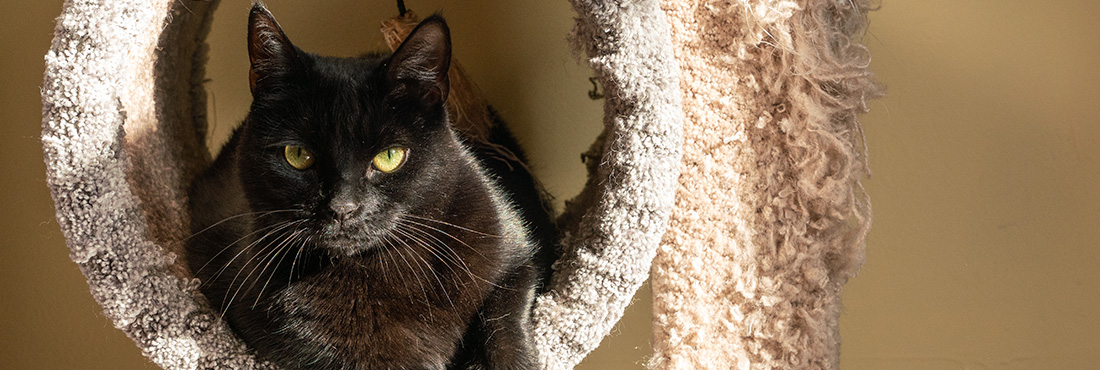With coconut oil becoming increasingly popular as a cure-all, there has been a huge surge in those who aren’t yet sold on whether there are truly any benefits for their pets. If you’ve been wondering whether cats can have coconut oil, or if there is even a special coconut oil for cats, you’ve come to the right place. Below, we’ll tell you everything you need to know about whether coconut oil is good for cats, the benefits of coconut oil for cats and even how to use coconut oil for your pets.
Is Coconut Oil Safe for Cats?
With coconut oil being hailed as a superfood and beauty secret for humans, it’s no wonder that coconut oil for cats is being spouted as the next big thing. However, is coconut oil good for cats? And is it safe for cats to eat coconut? The answer really comes down to a simple yes.
Of course, like all good things, moderation is absolutely key, here. We would never recommend that you give your cat more than one teaspoon a day, unless you had been otherwise directed by your vet. However, when it comes to the question “can cats have coconut oil?” the answer is usually a definitive yes – the only exceptions to this being if your cat has allergies to coconuts or if your vet has advised against it.
Benefits of Coconut Oil for Cats
While coconut oil can’t solve everything, it certainly can help with a lot of illnesses and ailments. Especially if those ailments are minor. Everything from dermatitis to brain health can be improved with a healthy dose of coconut oil. Some of the most common reasons for using coconut oil on cats include:
- Coconut oil for cats itchy skin
It’s hard to describe how irritating itchy skin can become, unless you’ve suffered with it yourself. Luckily, coconut oil is well-known for helping with skin problems and studies seem to indicate that a topical treatment of coconut oil on your cat’s itchy skin can help to alleviate some of the symptoms.
If you have a cat that is constantly licking or scratching, and itchy skin is suspected, it can be worth trying coconut oil topically on dry skin. If the problem appears to be all over, then feeding your cat a little coconut oil may help to alleviate some of the dry, sore skin spots.
- Coconut oil for cats hairballs
By adding a little coconut oil to your cat’s food, you can cut down on the level of inflammation along the digestive tract. This can help to reduce both the discomfort of hairballs and the frequency of which your cat may cough up hairballs. It can also help the hairballs themselves to bulk up and pass more easily, as the oil can help “smoothe” the passing of the otherwise rough balls.
Just remember, if hairballs are increasingly common for your cat, it may be worth a trip to the vet to make sure everything is clear along the digestive tract.
- Coconut oil for cat urinary tract infection
While there isn’t any specific research into the effect that coconut oil has on UTI’s, there is a growing consensus of the antimicrobial properties that virgin coconut oil holds. Being antimicrobial, they can help your cat to resist the onset of urinary tract infections and flush out any bacterial growth. Of course, once your cat has developed a UTI, only a trip to the vets can help.
While coconut oil may not clear up urinary tract infections, they can certainly help to alleviate the uncomfortable symptoms that accompany the issue. Applying coconut oil externally can help to reduce the pain and discomfort that comes with UTI’s, making urinating more comfortable for your cat.
You May Also Like: Cat Food For Urinary Tract Health
- Coconut oil for fleas on cats
Coconut oil provides a fantastic benefit because it includes lauric acid, which not only repels fleas but also kills them. Rather than using strong treatments which can cause reactions in some cats, using this natural flea repellent can help to cut down on the number of infestations your cat picks up and reduce the inflammation that comes with flea bites.
Other Flea Treatments For Cats include Flea Shampoo for Cats, Flea Comb for Cats and Flea Collars for Cats.
How to Give Cats Coconut Oil
For helping to treat skin problems and flea infestations, you can apply coconut oil directly to the cat’s skin. How to apply coconut oil to cats’ skin is surprisingly easy. The oil should naturally melt on your hands, due to the natural body temperature we hold. So, rub the oil between your hands and then pet your cat – with a little added vigor. This should help the coconut oil to be applied evenly across their entire body.
If there are specific areas that you’d like to target, then you can simply use a small amount of coconut oil. Rub it between your fingers, so that the oil is suitably viscous, before applying it to the sore, or dry, area of the skin. Generally speaking, between one and two teaspoons of coconut oil should be enough to cover the entire body and should be applied daily.
You can also give your cat a little coconut oil with their food, to help their digestive issues, such as hairballs or inflammation, if you prefer. Simply add ¼ to ½ a teaspoon, twice per day, to your cats usual food. Bear in mind that this should be added in small doses until you reach the full amount required, as giving your cat too much at once can cause stomach upsets.
The great thing about coconut oil is that you don’t have to stop giving it, once the symptoms you’re trying to alleviate have cleared up. Since feeding coconut oil to your cats is relatively harmless, you can continue giving them a small amount each day, to help maintain their healthy lifestyle. Just be aware that, if you give your cat too much coconut oil, they will likely have a bit of a stomach upset, which can be shown through vomiting and diarrhea. If this happens, cut down their daily intake to roughly ¼ of a teaspoon, every day.
Sources:
- Elizabeth Xu, Coconut Oil for Cats: Is It a Good Idea?, PetMD
- People Foods to Avoid Feeding Your Pets, The ASPCA
Leave a reply
Note: The advice provided in this post is intended for informational purposes and does not constitute medical advice regarding pets. For an accurate diagnosis of your pet's condition, please make an appointment with your vet.









Hi! My elderly cat has a UTI & I’ve never used coconut oil before!
I’ve put a little in her fish today & see how it goes!
Also, didn’t realise it was good for flea treatment!
Thankyou for ur advice!
Would rather not use chemical laden
products on the elderly, she’s very active for 18 but she’s a senior lady so will get a few aches/pains no doubt & I want her dotage to be as comfy as possible!?